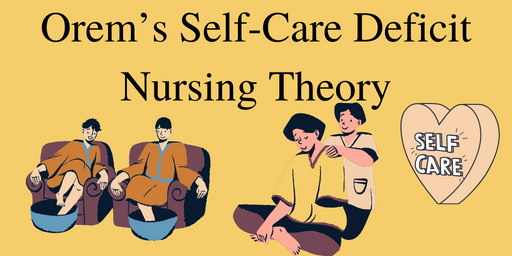Self Care Deficit By Orem's


Orem's Self-Care Deficit Nursing Theory
One of nursing's grand theories, Orem's Self-Care Deficit Nursing Theory (SCDNT), is a vital component of nursing's philosophical foundation.
The impetus of the theory, to define a curriculum for practical nursing, led Orem to recognize that effort needed to be exerted on the conceptualization of nursing and nursing's relationships to patient needs and patient care.
Orem
proposed that nurses should be expected to have specialized abilities that
qualifies a person to nurse. These abilities she called nursing agency which,
together with patient needs and patient abilities, became the structure and
focus of the SCDNT (Melnyk, KA, 1982).
Orem's Concern as Hospital Consultant
In 1952, working as a hospital consultant nurse with the Indiana State Board of Health, Dorothea Orem was concerned about the state to which nursing was evolving. Nurses were engaged in nursing practice but were not able to articulate what nursing was. Nursing of the patient provided a major part of patient care.
A person becomes a patient because of a legitimate inability to care for himself or herself when recovering from illness or injury. One of the problems Orem evaluated was how patient care did not truly meet patient needs. The advances in medical and allied research and treatment changed the way nurses evaluated and planned patient care.
A broader concept of patient care was necessary. The active participation of patients in their treatment would be required to successfully meet the changing perspectives of patient care. Understanding the care needs of the patient was the obvious starting point for Orem.
“The act of nursing is practiced by 'doing for the person with the
disability, by helping him to do for himself, and/or by 'helping him to learn
how to do it for himself” (Orem, 1956, p. 85) .
What is Self Care
This general nursing theory is accepted as a relationship between self-care agency and therapeutic self-care demands, distinguishing self-care deficit from dependent care. Orem deliberately selected the term “deficit” for this relationship to be interpreted as insufficient, not as a human disorder.
The inability to meet demands of self-care reflects the fact that a need for nursing exists. Orem recognized an apparent discontinuity between patient care and patient needs. The concept that nurses had of their practice had not evolved at the same pace as had patient needs.
The obvious starting point for Orem toward understanding the care needs of the patient was to define, “What is self-care?” “When is nursing needed?” and “How do nurses provide nursing care?” The answers to these questions are derived from three interconnected theories central to the SCNDT: the theory of nursing systems, the theory of self-care, and the theory of self-care deficit.
All three theories combined become one general theory of nursing, with self-care deficit as the most comprehensive and at the core of her ideas. The relationship between the three theories is described in the following way. In the theory of self-care, self-care is an activity initiated on one's own behalf in the interest of health and well-being.
The theory of self-care deficit is the relationship between therapeutic self-care demand and self-care agency whereas self-care capabilities are not known or able to be met.
The theory of nursing systems is
the deliberate practice actions of nurses carried out to meet the therapeutic
self-care or develop the patient's self-care agency. This answers the questions
about the nature of care and the nature of nursing.
Central Concept of Theory
The central concepts of Orem's theory consist of
(a) Self-Care-caring for one's self to maintain life, health, and well-being
(b) Self-Care Demands varied degrees and kinds of care requirements needed at specific times or over a duration of time for meeting all of an individual's needs
(c) Self-Care Agency the power and capabilities to engage in self-care, influenced by external and internal factors
(d) Nursing Agency-the broad ability of nurses to perform nursing
(e) Self-Care Deficit-the actions and demands needed for self-care that are greater than the person's current ability for self-care
(f) Conditioning Factors-internal or external factors that affect an individual's ability to engage the kind and degree of self-care required (Orem, 2001).
Self Care Differ from Dependent Care and Nursing Care
This view distinguishes self-care from dependent care and nursing care, in which the agent acts on behalf of another person. However, the substantive theoretical and practical knowledge of self-care is the foundation for both dependent care and nursing care.
From this theoretical view, it is essential that nurses have substantive knowledge about self-care and understand that human beings are both the focus of their actions and the agents of their actions (Orem, 1991). In conclusion, nurses use the self-care deficit theory of nursing to aid them in their practice.
Many clinical studies have shown that implementing Orem's theory has a positive effect on patients, nurses, and health care organizations. Orem's seminal work, originally published in 1971, Nursing: Concepts of Practice, has been revised to its current 6th edition in 2001.
Orem's book remains a standard, having been
published in seven languages and implemented by nurses in over 19 countries.
Beginning in 1989, the World Congress of Self-Care Deficit Nursing Theory,
offers a forum for international developments for practitioners, researchers,
administrators, and educators (World Congress of Self-Care Deficit Nursing
Theory, 2004).




Give your opinion if have any.